
Rotavirus vaccination progress in Africa shoulders unprecedented challenge in pandemic
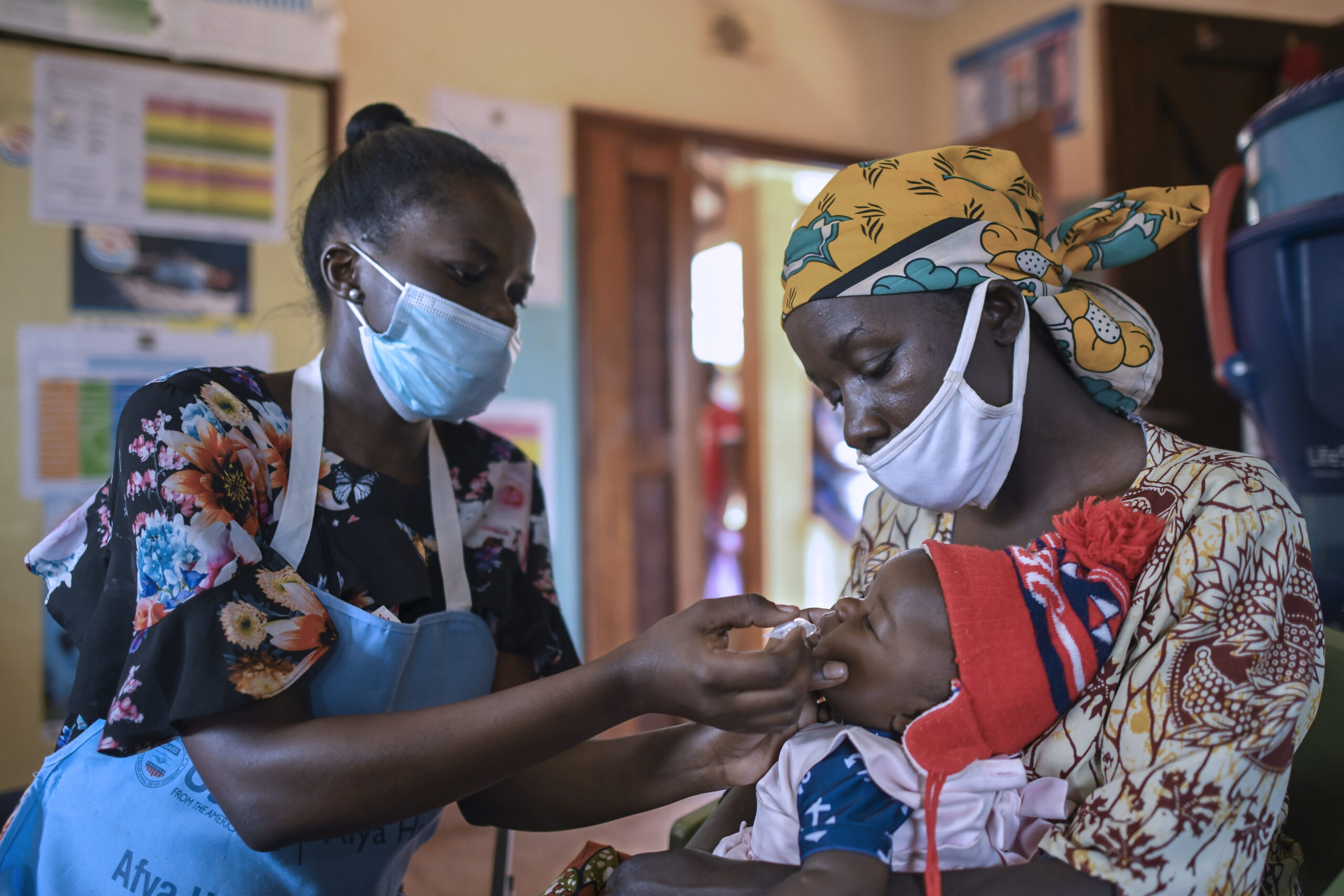
As participants gather virtually this week for the 13th African Rotavirus Symposium, organized by the University of Nairobi, Bill & Melinda Gates Foundation, and the South African Medical Research Council, the Rotavirus Organization of Technical Allies (ROTA) commends the many dedicated advocates who have worked for decades to increase rotavirus vaccine access across the continent. Rotavirus vaccines have been instrumental to alleviating sickness and death in children throughout Africa. A focus on introduction, scaling, and sustaining the use of rotavirus vaccines is more critical than ever during the COVID-19 pandemic.
Rotavirus vaccines in Africa: How it started
A decade ago, when the first African Rotavirus Symposium was convened, rotavirus vaccine coverage was limited in Africa to a handful of countries.
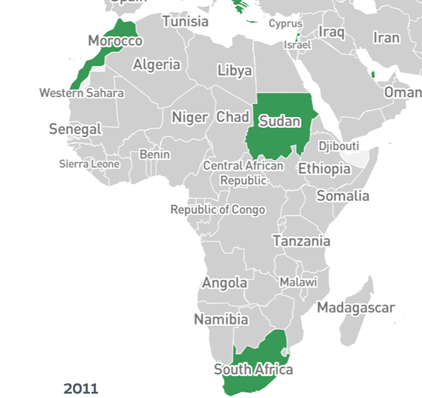 Universal vaccine introduction over time – 2011. Source: IVAC’s VIEW-hub“There wasn’t a single [physician] practicing in Kenya who wasn’t aware of a child with diarrhea who died or who wasn’t aware of full wards set aside in hospitals for children with diarrhea,” says Dr. Fred Were, Dean of the School of Medicine at the University of Nairobi. “The fact that the disease and its consequences, especially death and hospitalization, were known to everybody made it easy for us in child advocacy.”
Universal vaccine introduction over time – 2011. Source: IVAC’s VIEW-hub“There wasn’t a single [physician] practicing in Kenya who wasn’t aware of a child with diarrhea who died or who wasn’t aware of full wards set aside in hospitals for children with diarrhea,” says Dr. Fred Were, Dean of the School of Medicine at the University of Nairobi. “The fact that the disease and its consequences, especially death and hospitalization, were known to everybody made it easy for us in child advocacy.”
It’s estimated that rotavirus vaccines stopped up to 900,000 deaths from occurring between 2011 and 2020. To date, 37 of the 47 countries in the WHO African region have introduced rotavirus vaccine.
“A new generation of doctors don’t know what it is like to have wards full of children with diarrhea,” says Michelle Groome, PhD, Head of South Africa’s Division of Public Health Surveillance and Response at National Institute for Communicable Diseases. “Our wards were practically empty as a result of rotavirus vaccine use.”
In Benin, which introduced rotavirus vaccine in late 2019, mothers and health workers discuss the importance of rotavirus vaccine for children’s health in this 4-minute video. Read more about African country introduction experiences on our website.
How it’s going
While significant progress has been made, the pandemic has had an undeniable impact on the use and study of rotavirus vaccines, which is the theme of this year’s African Rotavirus Symposium. Worldwide, COVID-related lockdowns and concern about transmission have led to a drop in the administration of all childhood vaccines.
“People were scared of getting infected when going out to hospitals, so mothers were not taking their kids there,” said George Armah, PhD, of the University of Ghana. “The EPI attendance fell about 30%, and rotavirus was definitely affected,” he said.
Nonetheless, some countries have managed to make progress with rotavirus vaccines in the last two years. For example, Ghana successfully switched to a different rotavirus vaccine product, ROTAVAC, in the midst of dealing with COVID in 2020.
Visualizing rotavirus vaccine access in Africa
As scientists and advocates continue advancing rotavirus vaccination in Africa during the pandemic, one truth remains clear: rotavirus vaccines work. Their substantial health and economic benefits have been documented across at least a dozen African countries.
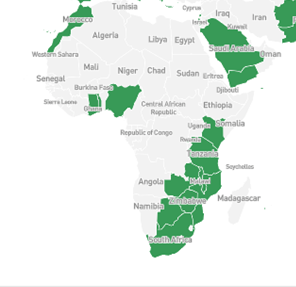 Evidence of rotavirus vaccine impact has been collected from across the continent (Source: IVAC’s VIEW-hub)But while the vaccine’s impact is undeniable, coverage remains highly variable both within and between countries. Millions of children remain unvaccinated against rotavirus, vulnerable to its life-threatening, dehydrating diarrhea. Reaching these children will require sustained advocacy and innovative ideas.
Evidence of rotavirus vaccine impact has been collected from across the continent (Source: IVAC’s VIEW-hub)But while the vaccine’s impact is undeniable, coverage remains highly variable both within and between countries. Millions of children remain unvaccinated against rotavirus, vulnerable to its life-threatening, dehydrating diarrhea. Reaching these children will require sustained advocacy and innovative ideas.
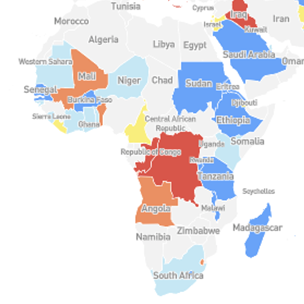 Coverage increased for some African countries introducing and scaling up rotavirus vaccines, while decreasing in other because of lockdowns and other aspects of the pandemic. Key: red- low/low coverage (<69%), yellow – medium (70-79%), pale blue – high (80-89%), dark blue – very high (90-100%), 2020 data. Source: IVAC’s VIEW-hub.
Coverage increased for some African countries introducing and scaling up rotavirus vaccines, while decreasing in other because of lockdowns and other aspects of the pandemic. Key: red- low/low coverage (<69%), yellow – medium (70-79%), pale blue – high (80-89%), dark blue – very high (90-100%), 2020 data. Source: IVAC’s VIEW-hub.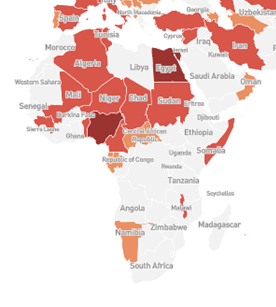 Red indicates over 2 million unvaccinated children, while orange indicates between 200,001-2,000,000 children unvaccinated. Source: IVAC’s VIEW-hub.
Red indicates over 2 million unvaccinated children, while orange indicates between 200,001-2,000,000 children unvaccinated. Source: IVAC’s VIEW-hub.
Rotavirus vaccine advocates in Africa are leading the call for sustained momentum against rotavirus despite the challenges of the pandemic. Champions like Michelle Groome, and Fred Were, and George Armah have been tireless advocates for the lifesaving potential of rotavirus vaccines for decades.
“Advocacy doesn’t end with introduction, it must always continue,” says Dr. Armah. “It would be a shame if we deny any child the chance of getting vaccinated, to get a better life in the future.”
Check out more interviews with ROTA Champions on our website.


